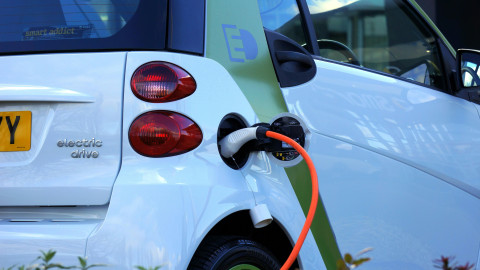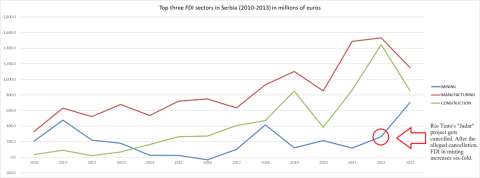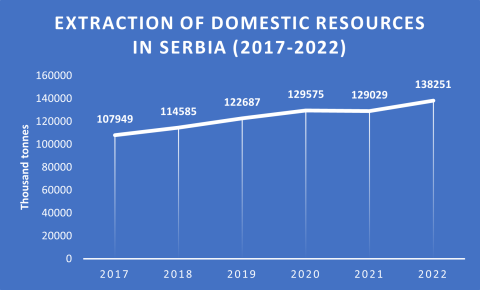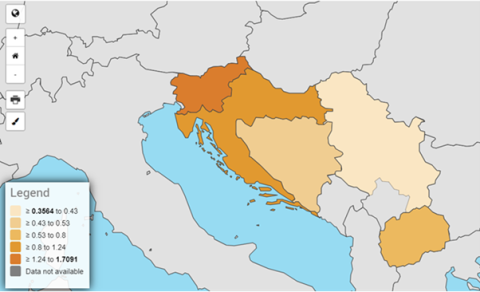Open letter regarding Rio Tinto and the “mining colony that Serbia is turning into”
Regiones
Not all information about Rio Tinto is public. However, we can already draw some conclusions about certain aspects of its project in Serbia. In this open letter, I wish to question the euphoria surrounding the economic benefits of lithium mining. This is important because the government constantly emphasizes some economic benefits of Rio Tinto while neglecting the dangers, sometimes even more than the company itself does, which means that the public discussion on this matter is not objective. Among other things, this is important because investments in mining in Serbia have already increased significantly, without having a notable impact on the standard of living of citizens. That is why we should look at the other side of the coin and see the damage that awaits us if we decide to become a mining colony of Europe.


All of this happened despite the alleged cancellation of Rio Tinto’s “Jadar” project – and that is the problem. Of course, in addition to Rio Tinto, there are other mining companies investing in Serbia, such as Zijin, Dundee and others. However, it is already public knowledge that Rio Tinto continued to buy land in Gornja Nedeljice and Slatina worth 1.2 million euros after the withdrawal of the spatial plan in Loznica. In addition, according to the Agency for Business Registers, the few dated data indicate that “Rio Tinto Exploration Danube” invested close to one million euros for mineral exploration in Serbia after the cancellation of the “Jadar” project, meaning that the company was active in more than one project. So, today, after Rio Tinto is once again active in our public sphere, there is no doubt that part of the invested funds came from this company, especially since preparations for the continuation of the project were obviously underway at that time. That is why, with all the data in mind, one can conclude that Rio Tinto never left Serbia.
The Limits to Growth of Foreign Direct Investments
To put it simply, we were deceived. But, the fact that we were deceived is not the biggest problem. Some other issues are even more problematic, and I want to highlight them so that our citizens understand the true scope of the problem.
First, our current model for attracting foreign investment to the Republic of Serbia is exhausted and has been so for some time. No single company can change this and no single politician would want to admit this to the public. For years, we have been subsidizing various foreign companies, paying our workers from the state budget in their stead, providing them with land, overlooking violations, our courts handing out only symbolic fines below the legal limits for river pollution. A number of things are happening that are detrimental to both the economy and politics. Foreign investments have been increasing while our GDP stagnates. Between 2009 and 2018, the share of foreign direct investment in GDP averaged 5.84%, and from 2012, this percentage grew to 8.12% in 2018, which, after Montenegro, is the highest in the region and beyond. Even so, GDP growth has been modest: 0.8% (2015), 2.8% (2016), 2.0% (2017), and 3.0% (2018). Since then, foreign investments have had no deeper effect, and the current account deficit has remained a constant in the Serbian economy.
That’s why we can question whether any individual company, be it Rio Tinto or any other, will be able to bring about significant changes. Will 1,300 employed engineers, geologists, and miners be able to pull the entire economy out of the gutter? No serious or sober person could claim that they would. If this is not clear, let us ask ourselves: Did the standard of living in Serbia increase as investments in mining increased? No. Is there a direct link between the increase in mining investments and the standard of living across Serbia, as Rio Tinto and Vučić assure us? No.
Therefore, it is far from true that Rio Tinto will save the Serbian economy. If it were the case, it would have already happened since investments in mining have already grown and are already generating jobs. But that did not happen. And, even if it did, it would have been undesirable because, if we really let the mining sector lead our entire economy, then we do not need to expect any other sources of growth, and that is a dangerous position to be in. For, according to a recent United Nations study, countries that are dependent on a single industry become reliant on that industry and become more vulnerable to shocks such as fluctuations in prices of raw materials, in this case, lithium.
The Situation on the Ground and the “Green” euphoria in the media
So what is the real benefit of the “Jadar” project, despite the rhetoric? According to a Rio Tinto study, Serbia will “gain” about 1.9 billion euros in indirect costs, which amounts to about 3% of GDP. It is anticipated that around 25 million euros will go to the municipality of Loznica in total, about 5 million euros annually for the local development fund, scholarships for students, and so on. Essentially, the effects will be locally concentrated, which is commendable – but it is neither revolutionary nor will it bring significant benefits to the whole of Serbia, despite the rhetoric from Vučić and those who support him.
It is important to reiterate this because these figures are far from what was mentioned in the media, such as the astonishing figure of 62 billion euros annually (almost as much as Serbia’s entire GDP) that was touted after such a statement was made by Maroš Šefčovič, executive vice-president of the European Commission for the European Green Deal. This is not the first falsehood to appear in our media, and it is not accurate even according to Rio Tinto’s own data. Judging by Vučić’s recent statement that the GDP will increase by 16.5% with the sale of electric vehicles, we can conclude that it is probably not the last one either.
However, what has been left out in the entire spectacle is the fact that investments in mining have a certain characteristic: As they increase, so does waste and the environmental damage, as well as legal processes related to environmental degradation. This should be highlighted since we already have data on this.
Namely, in the last two or three years, along with the increase in mining investments, there has been a nearly 150% increase in mining waste. According to the latest Statistical Yearbook of Serbia, in 2022, waste generated increased by 149.4% compared to 2021, totaling 174.7 million tons, of which 94.4% was mining waste. 18% of this waste is categorized as “hazardous,” and no other sector, apart from mining, has such a high percentage of hazardous waste. This is not surprising because the amount of extracted material is also growing: from 107,949 thousand tons in 2017 to 138,251 thousand tons in 2022, which is an increase of 22% in five years.

At the same time, resource productivity – one of the main indicators of the green transition that shows the consumption of materials in relation to economic activity as expressed in GDP – has decreased by 10% from 41 to 37.2 euros per kilogram of material from 2017–2022, which is the same period during which, as already mentioned, mining investments increased six times and extraction increased by 22%. This means that in this period we extracted more resources than necessary for our economic activity. In addition, every other country of the former Yugoslavia is more efficient than us in the use of domestic resources, and if you look at the comparative data of EUROSTAT, you will see that we were actually the worst in the Balkans in this regard.

EUROSTAT.
But in spite of all this – increasing quantities of raw materials being extracted by foreign companies, the growth of waste, the rise of mining investments, declining domestic efficiency in the use of resources, etc. – the standard of living is falling or stagnating throughout Serbia. At the same time, the standard of living should not only be understood simply in terms of wages (whose rise is basically following rising inflation) or spending capacity, but also in terms of the quality of our environment – the actual conditions in which we live and work. What contributed to the deterioration in these conditions is the ever-lackluster control of foreign companies, as well as the bad practice of commercial courts that often allow them to violate regulations without adequate fines. To translate this into common language – according to the data, we are indeed becoming a mining colony at the periphery of Europe.
Authoritarian Rule and the Development of Lithium Mining: a Secret Love Affair
So why continue with all of this if it is so harmful? There are, of course, obvious reasons, and we do not have to dig too deep, so to speak, to understand the interests behind Vučić's focus on mining in Serbia. Vučić’s rule, more or less, has relied on a deft balancing act between foreign powers, inherited from the government of his “democratic” predecessor, Tadić, who developed it in the early 2000s (here I have in mind the so-called four pillars of Serbian foreign policy: the EU, the USA, China, and Russia). Part of this balancing act has involved the uncontrolled growth of foreign investments, catering to foreign companies in order to secure their interest in Serbia, as in the case of Rio Tinto. Despite mass national protests in opposition to the company, the interests of Rio Tinto are now being prioritised with the support of German Chancellor Scholz and the ruling SNS party. In doing so, the party has once again offered its voters the illusion of jobs and stability – an illusion that, according to the data, is becoming increasingly transparent, as it evidently fails to compensate for the shortcomings of Vučić’s rule. I call it an illusion because, as shown above, it failed to improve Serbian society in the long term.
This long-term aspect is important to consider in the case of lithium. Vučić’s narrative about the economic benefits of lithium is part of a larger and unfolding attempt to bring about a production chain of electric vehicles in Serbia. With all of the above in mind, this chain will have to rely on the same logic of attracting foreign investments whose limits have already been reached. The fact that it is the same logic used by the SNS thus far is confirmed by the start of pilot production of electric vehicles in Kragujevac on July 22, with Vučić’s support, who stated that the state provided a 48-million-euro subsidy to Stellantis. Once again, subsidies are being allocated to companies whose profits will flow out of Serbia. Moreover, this approach will deepen further if Rio Tinto’s partner, InoBat, builds a battery factory. In this way, Vučić’s dream of completing an entire production chain – from lithium to batteries and cars – in Serbia, will likely be realized. It can thus be safely assumed that uncontrolled subsidies and corruption – the same game played by Vučić in previous cases – will be at play again. This is because, along with Chinese auto parts manufacturers also coming to Serbia, the economic pillar of the SNS government is obviously relying on the foreign auto industry, and Vučić quite probably sees electric vehicles as a condition for the continuation of his authoritarian regime. Here we have an absolute merger between the green transition and authoritarianism. Thus, no foreign investment in our country – no matter how large the figures thrown around are – can escape the colonial position Vučić is pushing Serbia into. Therefore, foreign investments will never replace the lack of planning, domestic investment, domestic stability, domestic development, and stable state governance – precisely because they rest upon their absence. That is why foreign investments cannot replace the state, no matter how much some of our politicians try to make that happen. On the contrary, FDI can (in this case, quite literally) undermine the state.
Technologies suited to dictatorships
Seen through the eyes of Rio Tinto, the investment in lithium could be described by the old Serbian saying: “Grandma gave a dinar [Serbian currency] to enter the party. She would now give two in order to leave it, but she can’t.”. In the professional literature, there is a concept of “technological momentum” (by Thomas Parke Hughes, though used by others as well), which describes a situation where an investor has sunk so much capital into a project that, even if the project becomes outdated, they cannot exit the race and end up dragging society further into it, creating increasingly damaging social consequences.
Unlike Rio Tinto, even the American investor and caricature capitalist Elon Musk is moving away from lithium batteries, and among chemists, sodium-ion batteries or hydrogen batteries are already well-recognized as the future materials in the industry. The economic historian Adam Tooze considers Rio Tinto an exception within the global green transition precisely because it clings to lithium “like a drunkard to a fence” (as another Serbian saying goes), despite alternatives. This is probably so because it cannot back out due to the massive amounts of capital invested by its shareholders into Serbia. Consequently, this “momentum” of dependence on Serbian lithium is growing, and now the company finds itself in a situation where it must invest more and more to salvage the billion-euro project “Jadar”. This “momentum” of Rio Tinto is pulling both Vučić and our society into the status of a mining colony of Europe.
Ultimately, this status carries certain consequences for our society. Beyond the physical impacts, the most dangerous would be the legal consequences, as the way Rio Tinto has been reintroduced – backed by Scholz and the warring Europe that will need lithium not only for electric vehicles but also for military purposes, and potentially for fusion reactors currently being developed by countries like France within European scientific consortia – potentially opens new doors to neocolonialism. This could further cement the mutation of our legal system towards the selective application of laws and expropriation in favor of companies, to the detriment of the public, and further distinguish us from the European Union in legal terms (I am referring here to our Foreign Investment Law - the government can arbitrarily allocate funds to projects Serbia designates as “special” aka “projects of national significance; and to the merging of our government with commercial courts that often ensure outcomes at the expense of citizens). The real danger is also evidenced by the fact that the link between authoritarian regimes and lithium in Serbia is not new; similar links have existed in Portugal between Prime Minister António Costa and the company “Savannah Resources”, and in Chile between Julio Ponce Lerou, Pinochet’s nephew, and lithium company “SQM”. Everywhere, this “momentum” of foreign investors in lithium compels them to develop interests in cooperation with local power brokers, who use their power to mutate legal systems and practices in favor of mining companies, typically in countries on the world’s periphery. This has culminated in Scholz’s visit, and Vučić is playing his role in the mining game perfectly.
Therefore, it is crucial to see where we stand on this path and how far we have come along it. Because, according to the data presented here, the process of Serbia becoming a mining colony has already begun. How far it will advance before being halted will depend on the citizens of the Republic of Serbia – in other words, on all of us together.



